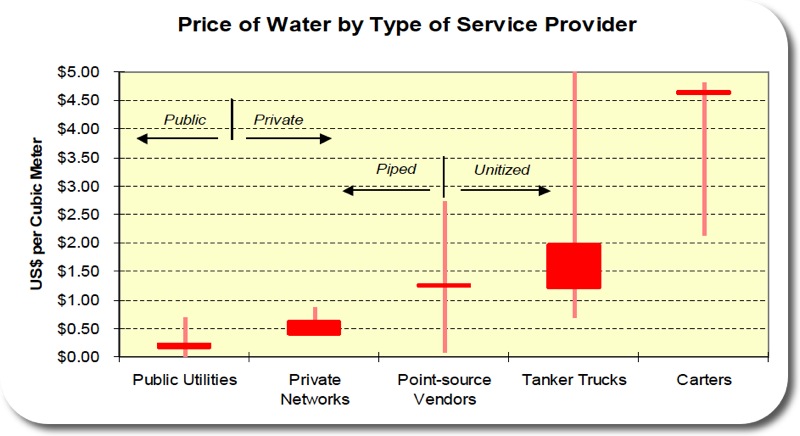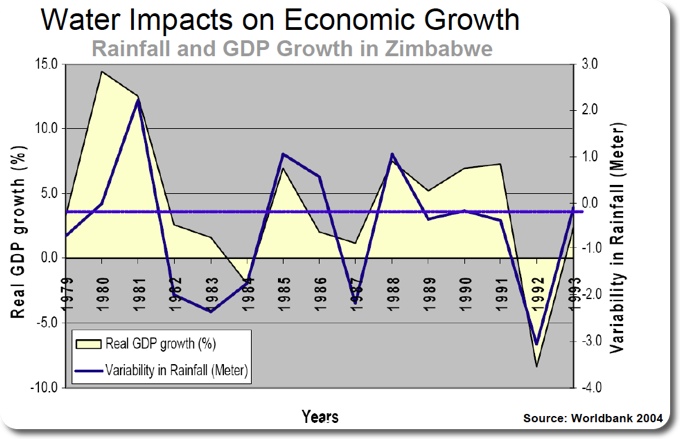Archive for the ‘Economics’ tag
Two Slides: Water Costs and Correlation of GDP with Precipitation
The IAHR student chapter at the University of Stuttgart recently held a colloquium on “Social, Economic and Political Perspective of Water”.
At this colloquium, Dr. Ulrike Pokorski da Cunha gave a presentation entitled “Nexus: Poverty–Water–Development”. Two of her slides were the ones that stuck in my head. I will show them in this post. Mrs. Pokorski da Cunha works for the “Deutsche Gesellschaft für Technische Zusammenarbeit” (GTZ), a federally owned institution that supports the German government in achieving its development-policy objectives on a technical level, in the “water policy” branch.
The first slide shows how different sources of water (on the x-axis) cost a different prize (y-axis). There can be made the distinction between public and private supply and between piped and unitized supply. The most cost efficient water supply is public water supply in a piped network. The most expensive water supply is if you need carters. The source of this chart is the PPIAF database

Poor People Pay More for Worse Water
The second slide I want to share shows how the economy of Zimbabwe is affected by precipitation. The line underlain by yellow shading represents the positive or negative change in GDP for Zimbabwe. The dark blue line represents the change in precipitation relative to the long term average of precipitation. This line is positive, if it rains more than on average and this line is negative, if it rains less than on average. Both line correlate well: Generally, if it rains a lot, the economy is doing well, if it rains little, the economy performs poorly.

Precipitation Impacts on Economic Growth
Thanks Ulrike Pokorski da Cunha for allowing me to share those two slides!
Environmental Modelling – Financial Modelling
I’ve spent a fair bit of my time as a grad students trying to model groundwater systems. There have been long discussions on modelling and its philosophy. Today was a PhD defence of such a grad student. Typical thoughts afterwards tend to be “… if we only had more data… ” or “… if we only knew the underlying processes better and could describe them… ” or “… if we only had more computing power available… ” .
I think a key trait of an environmental modeller should be his or her awareness of the quality of the data and the limitations regarding the quality of the predictions of the model. So when I read the headline “Climate Models Trump Financial Models” I was a bit worried. Sure, climate change is a pressing problem, and there is a lot of effort put into improving climate models. However, for me as an environmental engineer it seems that global financial markets should be better understood than global warming. And if it’s only because finance has been around for longer than environmental engineering! 🙂
I had never put much thought into how financial models might work, so this article brought up an interesting point for me, even though I’m not quite sure what I think about it:
“Climate models are very complex but you more or less understand the basic physics or chemistry,” said Derman. “[Finance papers] look like physics but a lot of the similarity is syntactic more than semantic.”
For example, stock options are priced with the Black-Scholes model, which says that stock price movement can be seen to move like the random movements of particles suspended in a liquid, i.e. Brownian motion. But stock price models differ from particle models because they describe the aggregate actions of people.
I guess quite a few processes are modelled like Brownian Motion. Why not stock option pricing. This just means though that we don’t know the underlying processes of stock option pricing better, so we could model the pricing in a more deterministic way. Then I thought a bit and it occurred to me that if you asked me, I probably couldn’t explain to you what is going on in the financial world these days. Why are we having this crisis? What are the underlying processes? Then I found this wicked little movie that explains these processes:
The Crisis of Credit Visualized from Jonathan Jarvis on Vimeo.
Based on this video, this seems to be a fairly straight forward process… 🙂 But I agree, there is a human factor involved, which admittedly doesn’t make things easier. I wonder what would happen, if you would throw an environmental modeller, a psychologist, and a finance person into a room for a while!
It seems like Weird was on a roll writing about financial models: They also point out, that the length of the finger of a trader is an indication for his degree of success. For me, that seems a little far-fetched! However, there’s again one interesting thought:
But leading up to the crisis — and underlying public acceptance of the mistakes and wrongdoing that produced it — was a widespread belief in the fundamental rationality of free markets and economic behaviors. That assumption may need to be revisited.
Climate Change and Water-Price-Change
London will be where Porto is now
This interesting and well designed map shows some cities but not at their current geographic location, but at a geographic location that currently has the climate that this city will have in 70 years.
Drinking Water too Expensive in Germany
The German magazine Der Spiegel has reported on may-23 how prices of publicly supplied drinking water vary in Germany. Today the same magazine interviews the economic minister of the province of Hessia on that topic today, and he announces dramatic price cuts.